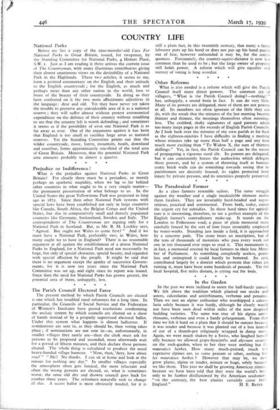In the Garden In the past we were inclined to
scorn the half-hardy annual. We felt above the tradition which planted out stocks and asters, calceolarias and antirrhinums, verbenas and petunias. Then we met an alpine enthusiast who worshipped a calceo- laria solely because it was hardy, although he clearly would not have been seen dead within miles of the now despised bedding varieties. The same was true of his alpine antir- rhinums, verbenas and even a hardy pelargonium. From that time we felt it hard on a plant that it should be outcast becau,e it was tender and because it was planted out of a box instead of out of a thumb-pot religiously wrapped in damp moss. Again, we were much shaken by a Swiss, who laughed herself silly because we allowed grape-hyacinths and alyssum saxanie on the rock-garden, when to her they were nothing but h. s mauvaises herbes. How many much-praised, much too expensive alpines are, to some peasant or other, nothing but les mauvaises herbes ? However that may be, we now grow plants, alpine or tender, minute or huge, solely because we like them. This year we shall be growing American zinnia•. because we have been told that they were the world's bes'• only to be further disillusioned by the American seedsman • " on the contrary, the best zinnias certainly come fror.-•










































 Previous page
Previous page